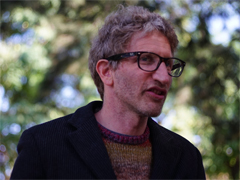Sketches of women, men and children crossing the Aegean Sea in search of refuge and less precarious lives with some thoughts of people who work with them in a spirit of solidarity. Filmed on the island of Lesbos, Greece.
The sea is, perhaps, the ultimate public space, the space of greater freedom, property of no one, where one can engage in activities which, in another context, might be socially deplorable or unacceptable. Despite economic, real-estate and urban planning pressures, many countries enact laws in order to ensure that coasts are not privatised and guarantee access to the sea for every citizen in addition to making a great effort to provide public spaces on land bordering the sea.
At some distance from the coast, in the open sea or international waters, national laws case to be in force. International law comes into effect in accordance with the Convention on the Law of the Sea. The open sea is classified as “common heritage of humanity” and the law is much less strict than the laws which apply on land.
This maritime space, common heritage of humanity, is also one which all too often becomes the only possible traversable route when it is no longer feasible to travel overland in order to flee from poverty or the horrors of war. War on the land chops up both public and private spaces, creating a continuous whole transforming one form into the other, intermittently and simultaneously, so that the sea becomes the only way out in desperate, risky flight.
Films have told the story of these harrowing journeys on countless occasions, showing starving Irish émigrés on Death or Canada, the American dream of Greeks and Armenians in America, America, the Jews who escaped from the Nazi nightmare on board the S. S. St Louis in Voyage of the Damned and desperate Albanians wanting to cross the Adriatic Sea in Lamerica.
All these films portray the dramas of European migration, a Europe which, since 18 March 2016, has turned asylum seekers, people who are considered to be refugees under the terms of United Nations Convention relating to the Status of Refugees, into “illegal immigrants”, illegal immigrants who are not allowed to enter a territory inhabited by 522 million people—in the 28 EU countries plus Iceland, Norway, Switzerland and Lichtenstein which are included in the Schengen Agreement—because they would mean an increase of between 0.3% and 0.4% of the population. The European heads of state have decided that, in order to legalise these “migrants” they must purge their past condition in a Turkish internment camp and, to this end, they have given their trust, as well as six billion Euros, to the Turkish authorities, authorities whose democratic credentials are questionable to say the least, authorities who also do business with Islamic State, one of the main offenders in the present refugee crisis.
It would seem that the European leaders are following the example of places like Australia, a country forged by—legal?—migrants who arrived just over two centuries ago and which, in 2015, decided to flout international law and turn back, on the high seas, boats full of immigrants coming from Indonesia, though the EU prefers to delegate the task to Turkey. Also following the example of Australia, perhaps, Europe has turned to a new kind of fiction to narrate the tribulations of migration, not with films like those described above but using propaganda like The Journey, a film financed with public money to deter flows of Afghan migrants heading for Oceania.
However, we’d do better to go back to the reality as shown in documentaries like The Sea Between Us in order to understand that, with this absurd, inhuman solution of resorting to offshore methods as a way of dealing with refugees, what amnesiac Europe is trying to do is to hide the story of lives as real as yours, mine and those of our grandparents who, one day, had to board a boat, with the hope of not dying during the crossing as their only luggage.



